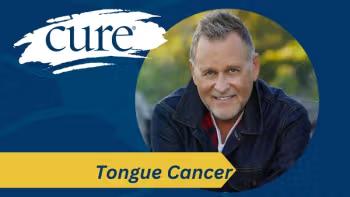
Head and Neck Cancer from a Patient's Perspective

Transcript:
Itzhak Brook, M.D., M.Sc.: It gave me an insight that physicians, a lot of time, even though they may be very knowledgeable and caring, truly don’t understand what goes on in the mind of the patient. Learning that you have a very, very life-threatening condition is very overwhelming and difficult, and the patient becomes completely dependent. And attitude toward the physician is very, very important. It’s important for physicians to be more caring, more mindful about what the patient and the family are going through.
Many physicians are, but experiencing it myself opened my eyes to the patient’s mind, how difficult and challenging it is. And being compassionate and showing the patients that you care helps patients a lot. I also relearned that it’s important to be your own advocate. And in many cases, the physicians and nurses don’t really do or explain to you everything. Or, when you encounter something that you don’t feel is right or if you have a question, patients tend to trust a lot of times, blindly, their medical providers. But I learned that if something doesn’t make sense, it’s important to ask the question to have an explanation.
Medicine is not 100 percent science. Almost everything, every procedure, every treatment — it’s a variety that has differences. So, if you feel that you are not comfortable with everything, ask, challenge, even request, a second opinion. I also learned that one should never mix all the friendliness with knowledge. Many physicians or most physicians are caring, warm people who want to help, but a lot of times, they are not the right person for you because a procedure or treatment you need can be provided better by somebody else who has seen more patients and done more procedures like the one you require. And many patients feel hesitant about challenging their physicians, insulting them. So, what I learned is that one has to be their own advocate. And when one feels that they want more or the best treatment, one should request it. Physicians should not be insulted if one wants a second opinion. And actually, many of them encourage it, so it’s important to go and get it. But also, I learned that even though I was a physician, whatever they told me when I had cancer prepared me. They told me this two or three times. I did not retain anything because I was so concentrated about getting the cancer out of my body. When they told me about side effects, complications and choices I could make, I wasn’t concerned with it. I just wanted the cancer out. That is a (time) when one needs an advocate, not yourself but a friend or a family member, a spouse who would be with you when you talk to your physician, so they can retain some of the information and send for you so that you get the best treatment.
Meryl Kaufman, M.Ed., CCC-SLP, BRS-S: That’s exactly right. I couldn’t agree more. What are some of the resources that you suggest patients turn to, to help find this information in the community or online? Do you have any suggestions?
Itzhak Brook, M.D., M.Sc.: Well, we are fortunate that everything is available online, not that everything online is true, but that’s a place to start. Usually going to a medical center, you find experts in most fields. If there’s another medical center or university medical school, that would be a place to ask. Another place to ask is in support groups for people in your condition for their experiences. There are support groups for all of this. Also, the Head and Neck Cancer Alliance has a website where people can talk and discuss it and ask for help. And those are some of the places people can go. And many times, asking your physician for somebody else not in their hospital is a good way to start.
Meryl Kaufman, M.Ed., CCC-SLP, BRS-S: Exactly. I agree. And support groups, of course, are a great source of information not just for the patient but for the family members as well. And I know that I find, particularly with laryngectomy patients, it helps to meet somebody else who has been through the process where you can see that this person can speak, and this person can breathe and work and eat and live their life. I think sometimes meeting somebody face-to-face helps you see the light at the end of the tunnel. Would you agree that that was the case in your situation?
Itzhak Brook, M.D., M.Sc.: Absolutely. Fortunately, I was able to meet other people who had gone through what I had, and I realized that after seeing them, talking to them, they have a very full life. I also went to a support group for laryngectomies in my region, and they were very, very supportive of me. And they gave me physical and emotional support, physical by giving me advice through instruments and books that help me cope with a condition that I was going through. And there are support groups in head and neck cancer across the country that can provide the help. And that is one place to go. I also went to a support group on Facebook for head and neck cancer. And there is also a support group for laryngectomies on the internet, as well, WebWhispers, that can also help people cope with it.
Meryl Kaufman, M.Ed., CCC-SLP, BRS-S: Absolutely.
Itzhak Brook, M.D., M.Sc.: I also, if I may say, wrote a guide for laryngectomy that does provide all the information about the medical, psychological and other issues that patients deal with, and that guide is available free for download from the American Academy of Otolaryngology website. And it also has been translated into 10 other languages, such as Chinese, Russian, Spanish, Portuguese, and Arabic. So, it can help people facing laryngectomy all over the world.
Meryl Kaufman, M.Ed., CCC-SLP, BRS-S: It’s a wonderful resource, and thank you for bringing that to our community in head and neck cancer and laryngectomy rehab. One of the things that I think is important for a patient is to understand anatomically what’s going on. Like you said, don’t just trust your doctors. Look at pictures and look at videos and ask questions and really understand what’s going on physically. And I know that as a speech pathologist, I think what empowers patients most is meeting other patients before their surgery and being able to show patients pictures, diagrams and videos and meet other patients to help them really grasp this so that they can become their own advocate and ask the right questions; all people, not just physicians and their family members as well. So, I completely agree, and I hope that one of the take-home points from this is it’s really, really important that you understand what’s going on and what your treatment choices are and how to find the right physician and right support network to get you through this.
Transcript Edited for Clarity


